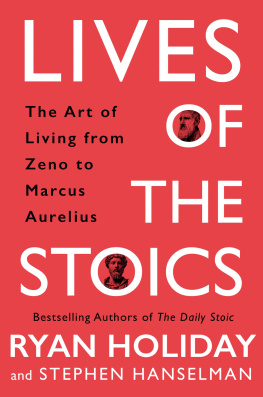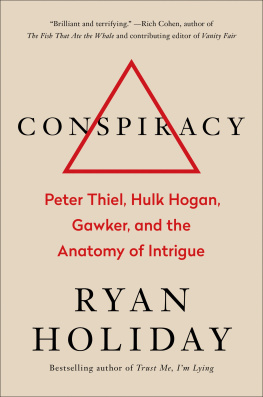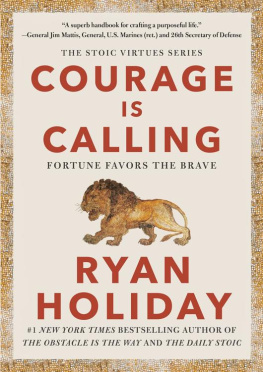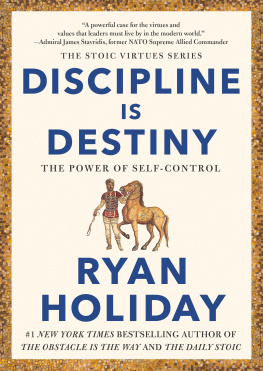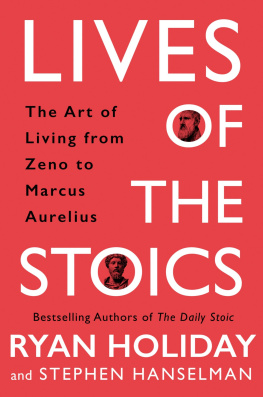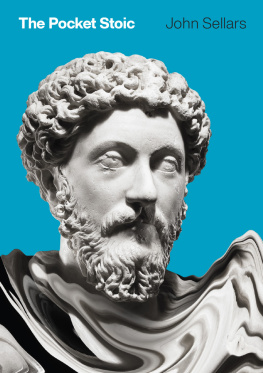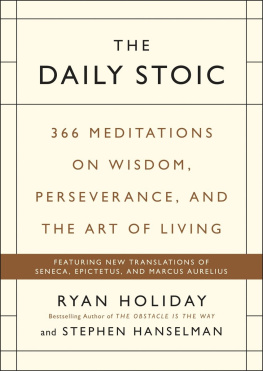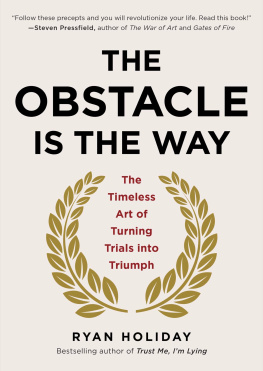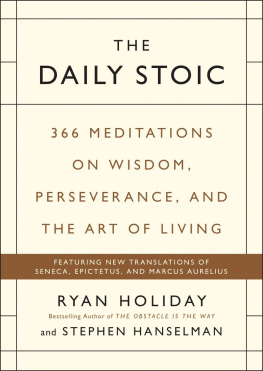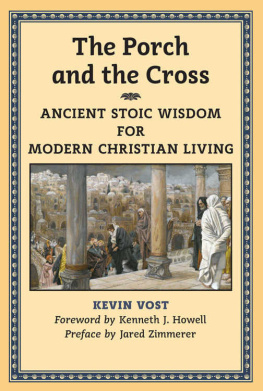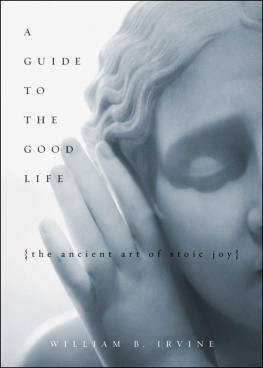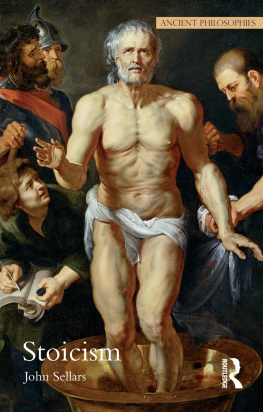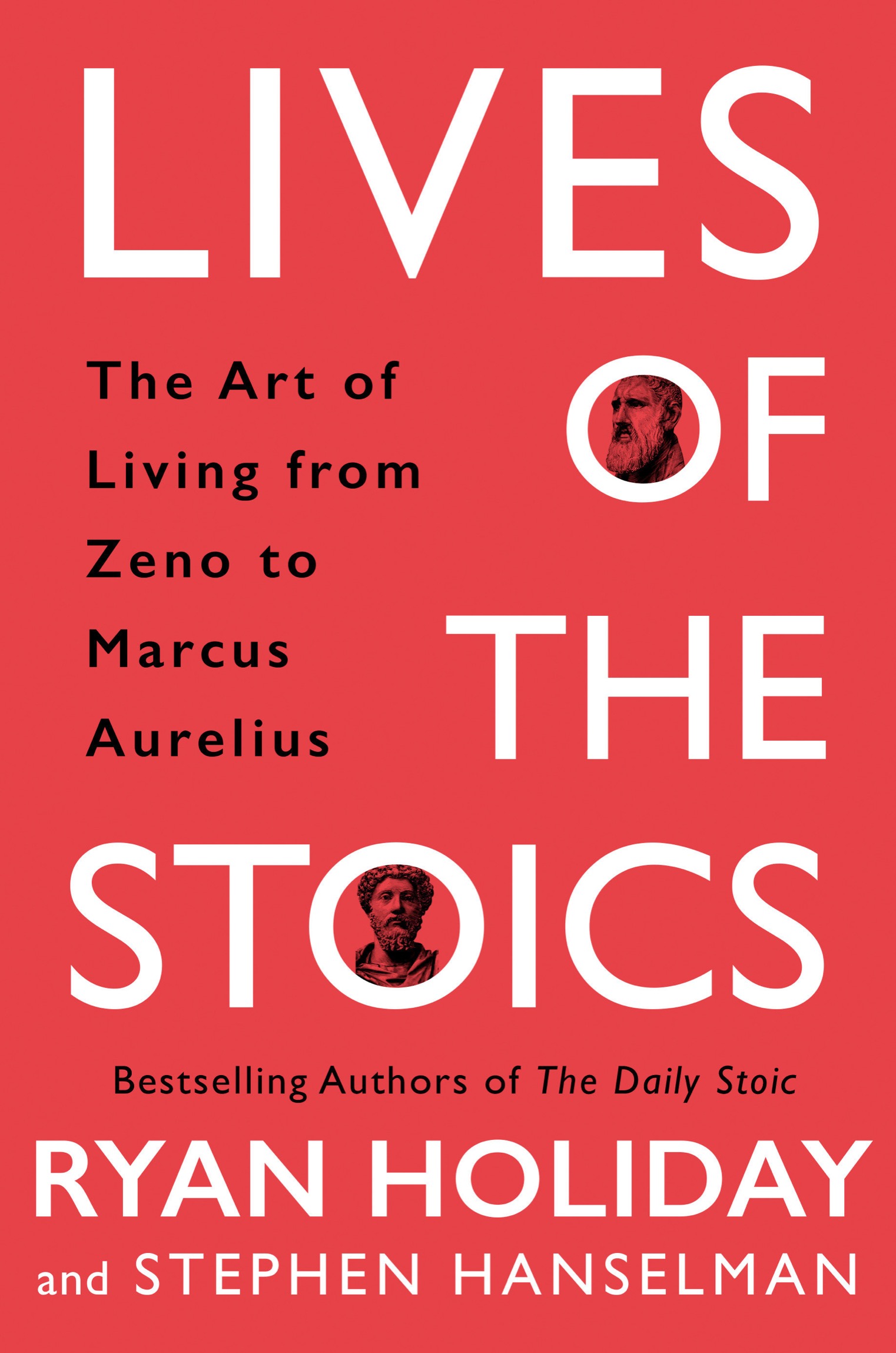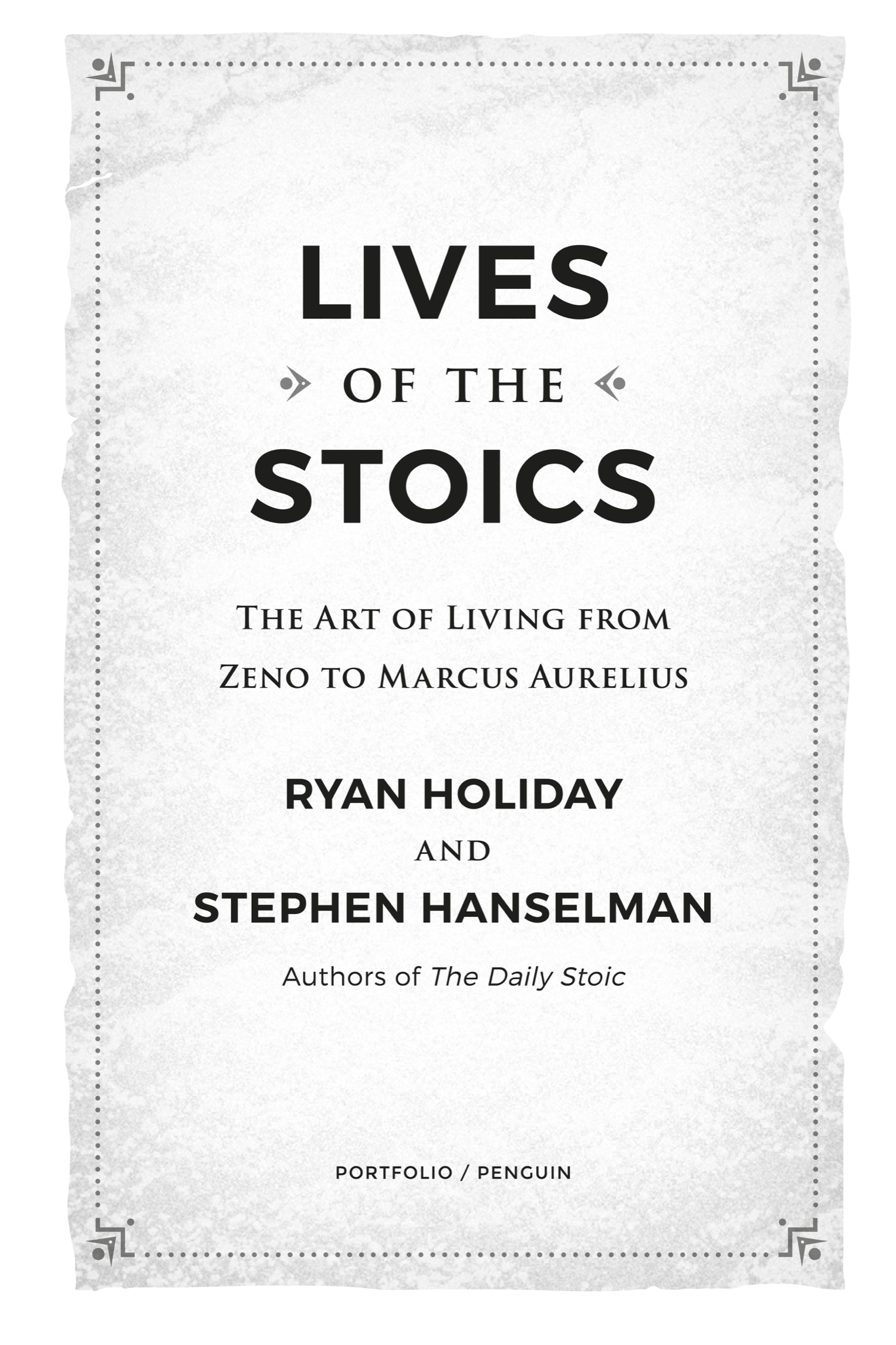Penguin supports copyright. Copyright fuels creativity, encourages diverse voices, promotes free speech, and creates a vibrant culture. Thank you for buying an authorized edition of this book and for complying with copyright laws by not reproducing, scanning, or distributing any part of it in any form without permission. You are supporting writers and allowing Penguin to continue to publish books for every reader.
Illustrations by Rebecca DeField. Used with permission.
Names: Holiday, Ryan, author. | Hanselman, Stephen, author.
Title: Lives of the stoics : the art of living from Zeno to Marcus Aurelius / Ryan Holiday and Stephen Hanselman, authors of The daily stoic.
Description: New York : Portfolio/Penguin, 2020. | Includes index.
Identifiers: LCCN 2020011797 (print) | LCCN 2020011798 (ebook) | ISBN 9780525541875 (hardcover) | ISBN 9780525541882 (ebook)
Subjects: LCSH: Stoics.
Cover illustrations: Rebecca DeField / 2020 Ryan Holiday. All rights reserved.
INTRODUCTION
The only reason to study philosophy is to become a better person.
Anything else, as Nietzsche said, is merely a critique of words by means of other words.
No school of thought believed thisin the power of deeds over ideasmore than Stoicism, an ancient philosophy that dates to Greece in the third century BC.
It was Seneca, a Stoic philosopher of the Roman era, far removed from the academy, who would say quite bluntly that there was no other purpose to reading and study if not to live a happy life.
Yet this is not the role philosophy plays in the modern world. Today its about what smart people say, what big words they use, what paradoxes and riddles they can baffle us with.
No wonder we dismiss it as impractical. It is!
This book will be about a different and far more accessible type of wisdom, the kind that comes from people like Seneca, a man who served his country at the highest levels, endured exile and loss, struggled with ambition and personal flaws, and ultimately died tragically and heroically trying to make good on his theories. Unlike the so-called pen-and-ink philosophers, as the type was derisively known even two thousand years ago, the Stoics were most concerned with how one lived. The choices you made, the causes you served, the principles you adhered to in the face of adversity. They cared about what you did, not what you said.
Their philosophy, the one that we need today more than ever, was a philosophy not of ephemeral ideas but of action. Its four virtues are simple and straightforward: Courage. Temperance. Justice. Wisdom.
It should not surprise us then that we can learn just as much from the Stoics lived experiences (their works) as we can from their philosophical writings (their words). The wisdom offered by Cato the Youngers published works is scantas a lifelong public servant, he was too busy in office and in battle to write down more than a few sentences. But the story of how he comported himselfwith ironclad integrity and selflessnessamid the decline and fall of the Republic teaches more about philosophy than any essay. Along those lines, little survives to us about the theories of Diotimus, an early-first-century BC Stoic, but the legend of his literary fraud shows us how easily even righteous people can go astray. The same goes for the life of Seneca, whose eloquent letters and books survive to us at length, and yet must be contrasted with the compromises required by his job in Neros administration.
And its not just the lives of the Stoics that teach volumes but also their deathsevery Stoic was born to die, whether it was by assassination, suicide, or, most uniquely, of laughter, as was the case for Chrysippus. Cicero once said that to philosophize is to learn how to die. So the Stoics instruct us wisely not only in how to live, but in how to face the scariest part of life: the end. They teach us, by example, the art of going out well.
The Stoics profiled here are mostly men. This was the curse of the ancients: It was a mans world. Still, they were diverse. The philosophers in this book hailed from the far-flung corners of the known world, from Cyprus, Turkey, Egypt, Libya, Syria, and Iraq. And though their philosophy would take root in Athens, the Stoics saw the whole earth as their country. The founder of Stoicism, Zeno of Kition, a Phoenician, would famously refuse Athenian citizenship because it conflicted with his sincere belief in cosmopolitanism. Stoicism eventually made its way to Rome, where it loomed large in Roman life, directing the course of one of the biggest and most multicultural empires in history.
Across the first five hundred years of Stoic history, its members form an astonishing spectrum of stations in life, ranging from Marcus Aurelius, the all-powerful emperor, to Epictetus, a lowly slave who was crippled in captivity but whose writings and life were an example that inspired many, including Marcus. Some of their names you may already be familiar with, and others (Aristo, Diogenes of Babylon, Porcia, Antipater, Panaetius, Posidonius, Arius, and Musonius Rufus) likely not. But each is worth knowing about, whether they were merchants or generals, writers or athletes, parents or professors, daughters or diplomats.
Each has something important to teach us. Each walked the path of virtue in a way that we must learn from.
The word stoic in English means the unemotional endurance of pain. Yet even a cursory look at the stories of these (mostly) men proves an enormous difference between the expectations of that lowercase stoicism and the realities of the philosophy, uppercase Stoicism. Stoicism is a vibrant, expansive philosophy filled with people who loved, who grieved, who strove, who fought bravely at close range in the great battles of history, who raised children, who wrote important works, who stood tall, who believed, and who lived. In their own time, these philosophers resisted the stereotype of lowercase stoicism, that they were unfeeling beasts of burden who suffered through life and looked only inward.
The Stoics were never simply resigned to the current state of things, accepting without objection the injustices of the world. Rather, they formed the most ardent Resistance to the tyranny of Julius Caesar, Nero, and others in the ancient world, even influencing popular democratic reforms. Just as Stoicism was the stern nurse of heroes during the first century of the Empire, to borrow historian Richard Gummeres expression, it would play a similar role for many centuries after, including inspiring the leaders of the American Revolution as well as patriots like Thomas Wentworth Higginson, who led a black regiment for the Union cause in the Civil War (and was a translator of Epictetus). The Stoics have always been people who bled and died for change, whether it was appreciated or successful or not.

